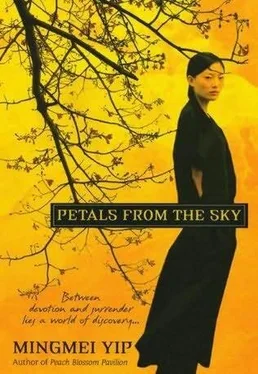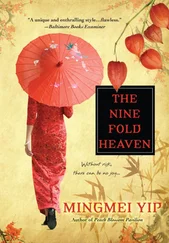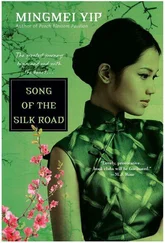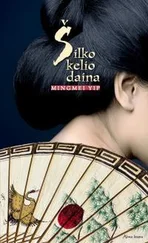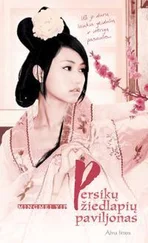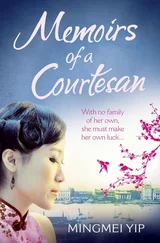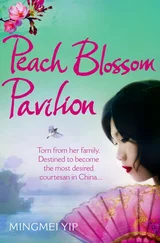When cold chills every crack, purity arises.
Now I realize I was the moon in a past life.
I kept savoring “I was the moon in a past life,” until Michael asked, “What is it, Meng Ning? Can you translate it for me?”
After I did, he said, “If I were the moon in a past life, then you must be the Moon Goddess Chang E, who ascended to heaven and flew into my arms.”
“Sometimes I wish I were Chang E.”
Michael looked puzzled. “But what of her poor husband? Meng Ning, don’t go away to the moon. China is far enough away. I need you here on earth. With me.”
It felt strange to me, talking of earthly desire in this isolated temple. Strange to really be wanted by a man.
We went on joking for a while before my gaze was arrested by a piece of calligraphy. I went up to take a close look at the flowing characters executed in the running style.
So I have looped around. From the preciousness of sensation to the harmfulness of being attached to it.
Intrigued, I wondered who had written this poem and what the motivation was.
I translated to Michael and told him my thought. He said, “I think it’s just another Zen poem about nonattachment.”
Just then the young monk returned. With tender respect, he helped another monk, old and wrinkled, who was inching forward with a cane. As slow as the turtle, Old Monk settled down onto a chair. His brown leathery face, brown robe, and brown cane blended in with the chair and the room. If a guest entered the room now, I bet he’d have taken Old Monk merely as another piece of antique furniture!
The young monk invited us to join them at the table.
Old Monk looked at us and split a toothless smile from a mouth like a dried-up well. His eyes, though yellowed and clouded, still penetrated, as if transmitting the law of Dharma directly from his mind.
Young Monk was now busy arranging the teapot, teacups, and dried fruit. When finished, he knelt at the altar table, muttered a short prayer, then offered his tea and fruit to the Buddha with utmost piety and respect.
I felt moved by this act of sincerity and devotion.
Then he poured another cup of tea and went to the old monk. To my surprise, he knelt down and offered him tea with the same piety and respect he’d paid to the Buddha.
After these offerings, the young monk, now looking relaxed, poured us steaming tea. Then he introduced the old monk to us as Master Detached Dust and himself as Eternal Brightness. Old Monk responded with an innocent smile.
Eternal Brightness said, “In comparison to our tortoise, my Master Detached Dust is quite a young man at only one hundred and five.”
I translated this to Michael. He exclaimed disbelief, but then bowed respectfully to Detached Dust. And, I believed, to the mystery of his longevity.
Suddenly the master spoke. “Do you two watch TV?”
This question from a one-hundred-and-five-year-old Zen monk recluse really took me by surprise-he should have long transcended the seven emotions and the five desires.
I translated to Michael. He said, “I feel sorry for him; he must be extremely lonely here.”
Then I turned back to Detached Dust. “We have a TV, but we don’t watch much.”
The master surprised me again by saying, “I’ve heard about it, but I’ve never seen it.”
“Master, you mean never in your whole life, not even once?”
“No.”
Now this living fossil really intrigued me. “Aren’t you curious to watch TV?”
Instead of directly answering my question, he smiled contentedly. “I have my garden, my sutras, the sky and the clouds.”
I translated this to Michael and he said, “Ask him whether he’s bored sometimes.”
I turned and asked the master.
His reply was, “Night after night the moon shines on the pond.”
Eternal Brightness eagerly chimed in. “Since his youth, Master’s eyesight has been weak,” as if an apology were needed for Master’s not watching TV, and not connecting to the modern world.
“Then how can he read his sutras?” I asked.
“He’d already memorized most of them before he reached twenty.” He paused, then added, “But Master possesses the Buddha eye.”
I translated this to Michael and he nodded, looking deep in thought.
A brief silence. Then the young monk stood up, went to the cauldron, and held out a bamboo tray on top of which lay fat, snowy-white buns. The bun, hot and steaming in my hands, seemed alive and palpitating.
Michael, probably very hungry by now after our long climb under the sun, was devouring the bun and gulping down the tea with relish.
“Mmm.” He raised his thumb to the monks.
Eternal Brightness smiled back politely, while Master Detached Dust cupped his mouth with his gnarled hand and giggled.
Then, seeing that I was not eating, Detached Dust cast me a meaningful glance. “Miss, eat! Eat while it’s still hot.” Then he added, “Don’t wait till it gets cool.”
Was it a metaphor for my being indecisive about marrying Michael?
I smiled at him, then split open the bun. Paste of red beans spilled to peek at the world outside and immediately I stuck out my tongue to take them into this Mortal’s Field of Red Hot Passion.
When we finished our snack, Master Detached Dust said, “Honorable guests, I now have to work.”
Work? At one hundred and five?
Seeing that I was staring doubtfully at his master, the young monk explained, “Master is going to tend to his garden.” After that, he helped Detached Dust outside.
I told Michael about my conversation with the monks while we, amazed, watched Detached Dust at work. Though slow in his movements, he transmitted his special energy, his whole being spilling happiness. He moved deliberately but with a carefree air, watering, pulling out dead roots, cutting off yellowed leaves. He seemed not to feel the hot sun over his head or the baking earth under his straw-sandaled feet. He chanted in a faint voice as he went about his work.
Michael exclaimed, “Amazing! I hope I will live to his age and stay that active.”
When Eternal Brightness came back to the room, I asked, “Shifu, don’t you think that Master Detached Dust should…retire?”
“I’ve begged Master many times not to work, but his reply is always to recite the Zen rule: a day without work is a day without food. So”-the young monk shrugged and smiled wryly-“there’s nothing I can do. He always tells me that by cultivating the garden, he’s cultivating the Way. So how can he stop?” A pause, then, “Master says that he’s the guest of wind and dust. And his mind the ashes of dead fire.”
We stood together watching Detached Dust.
Then Eternal Brightness spoke. “I must work also. Please stay in our temple as long as you like.”
Suddenly I remembered the stone inscription in the main hall. “Shifu, that inscription about the young man who fell in love with a village girl, then took refuge after she’d married someone else…”
The monk had already guessed my question. “That young man is my master, Detached Dust.”
I was shocked to hear this. “Oh,” I blurted out, “what a sad story.”
The young monk cast me a curious glance, then corrected me. “No. Master determined to cut off all attachment after he realized his folly of falling into the entanglement of human desire.” He pointed to the calligraphy and recited, “‘So I have looped around. From the preciousness of sensation to the harmfulness of being attached to it.’”
He turned to look out the window. “So look how happy Master is now.” He smiled. “Moreover, that’s why he lived to this ripe age.”
I followed Eternal Brightness’s affectionate gaze and saw Detached Dust now talking cheerily to an orchid.
Читать дальше
